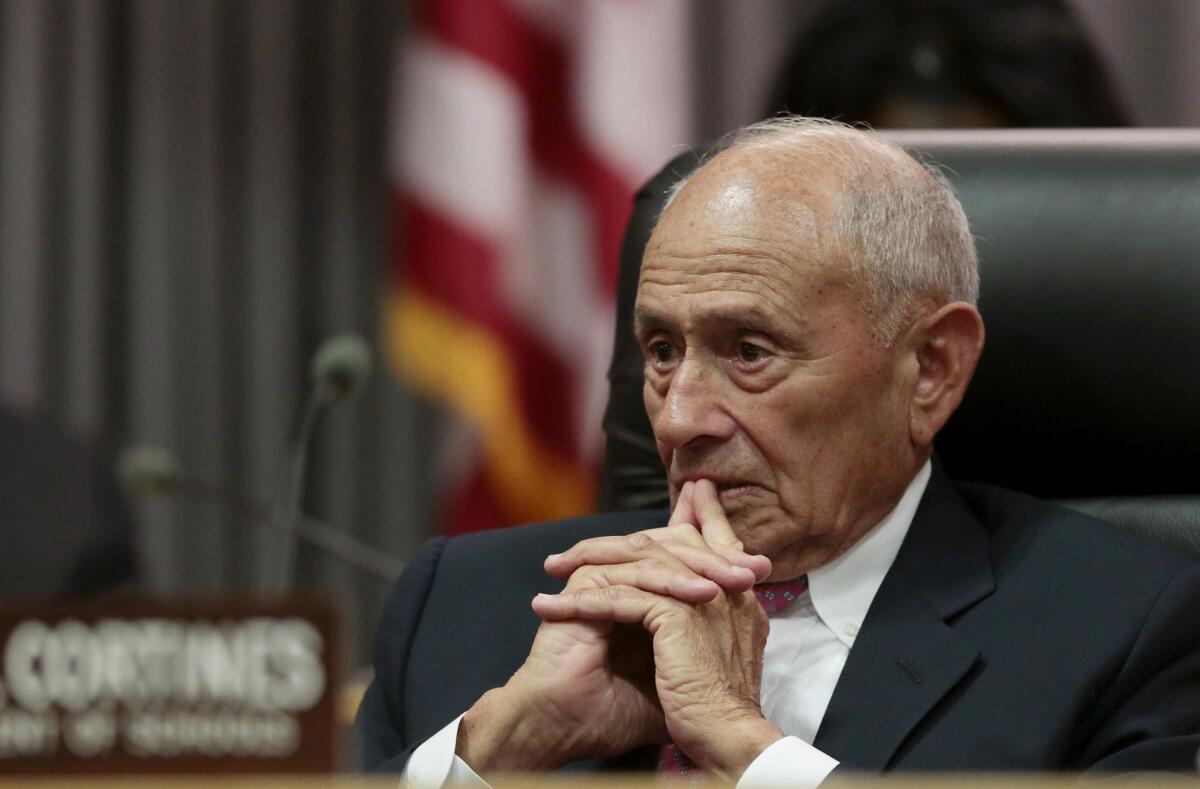L.A. Unified school board still struggling to name leader

Ramon Cortines is currently the interim superintendent for the Los Angeles Unified School District. The replacement leader was not selected after a five-hour meeting of the L.A. Board of Education on Tuesday.
- Share via
After meeting behind closed doors for about five hours Tuesday, the L.A. Board of Education adjourned without naming a new leader for the city school district.
“This is very, very hard work, as it should be,” said school board President Steve Zimmer. “There has not been one moment in which the weight of this decision, and those who are affected by it, have not been present in the room. I’m very proud of this board.”
The seven-member school board began a national search for a new leader in the fall. Ramon C. Cortines came out of retirement 14 months ago to serve as interim superintendent after John Deasy resigned under pressure in October 2014. Cortines, 83, had run the district twice before and was seen as a stabilizing force in the L.A. Unified School District but not as a permanent replacement.
Join the conversation on Facebook >>
Several Los Angeles Board of Education members have said that finding a calm, collaborative and productive leader like Cortines was a top priority.
Zimmer insisted that there are excellent administrators who are available and who want the job.
“We have very, very strong candidates and we have diverse candidates and we have candidates that rise to the level of skill and expertise and experience that the most important job in public education demands,” Zimmer said.
He added that he still expects the board to make a choice by the end of January. The next meeting on the superintendent is scheduled for Monday.
The board has conducted a national search for a new superintendent in secret. The names of finalists were not released. But sources have said that the shortlist included L.A. Chief Deputy Supt. Michelle King and St. Louis Supt. Kelvin Adams.
If board members had been willing to pick a leader on a split vote, the selection process could have ended weeks ago, according to inside sources who were not authorized to comment. At least three candidates seemed certain to claim four votes or more, but not the 7-0 united front that the board wanted to present to its pick and to the community.
The candidates who could have prevailed on a split vote included King and San Francisco Supt. Richard Carranza -- who withdrew from consideration this week. Fremont Unified Supt. Jim Morris also could have drawn four votes, even though it’s not clear he was granted a second interview.
The split varied from candidate to candidate, and the issue came down to which board members were more willing to back down from their opposition to a particular candidate to make the vote unanimous. At a marathon weekend meeting on Dec. 19, no side completely gave in.
In looking for its next leader, the board went straight from a list of more than 100 to a group of six or seven that it wanted to interview. A smaller group was called back. The interviews were lengthy, as long as two hours and involved the entire board.
The new leader will step into the job at a watershed moment for the nation’s second-largest school system, which serves 650,000 students at more than 900 schools stretching from San Pedro to Sylmar.
L.A. Unified faces a long-term financial crisis driven by declining enrollment, lagging student performance, political tumult and recent policy fiascoes, such as a $1.3-billion effort to equip all students and teachers with iPads.
An outside plan, which was initially spearheaded by philanthropist Eli Broad and called for moving half of the district’s students to independent charter schools, could create further instability. In the last six years, the district has lost 100,000 students — half of them to charters, which are independently run, publicly financed and mostly nonunion.
The charter expansion proposal has polarized the district, pitting the teachers union and its allies against Broad and like-minded advocates who favor aggressive action to improve student achievement — including scaling back some teacher job protections and revamping performance review systems. The two sides have repeatedly clashed, most prominently in multimillion-dollar school board races.
“The most important task of an L.A. superintendent is to work to bridge the gap on the board between the so-called reformers and the so-called allies of the teachers union,” said David Plank, a Stanford University professor and executive director of Policy Analysis for California Education. “What holds L.A. back is this permanent fight — either you’re with us or against us. Getting past that is necessary for anything good to happen in the district.”
The Times receives funding for its digital initiative, Education Matters, from the California Endowment, the Wasserman Foundation and the Baxter Family Foundation. The California Community Foundation and United Way of Greater Los Angeles administer grants from the Broad Foundation to support this effort. Under terms of the grants, The Times retains complete control over editorial content.
Times staff writer Joy Resmovits contributed to this story.
For more education news, follow me @howardblume and @TeresaWatanabe
ALSO
Heavy downpours flood roads, hamper commuters in Southern California
Judge voids ex-columnist T.J. Simers’ $7.1-million jury award against L.A. Times
FBI probes mystery of San Bernardino shooters’ whereabouts for 18 minutes after massacre
More to Read
Sign up for Essential California
The most important California stories and recommendations in your inbox every morning.
You may occasionally receive promotional content from the Los Angeles Times.












